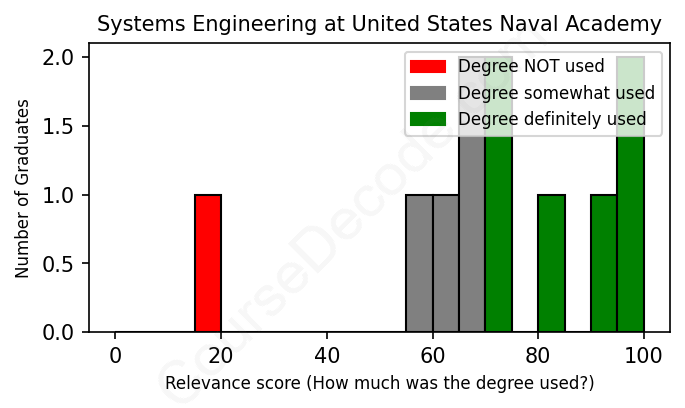
First, some facts. Of the Systems Engineering graduates from United States Naval Academy we've analyzed , here's how many have used (or NOT used) their degree in their career:

These are estimates based on AI analysis of 11 LinkedIn profiles (see below).
The verdict? Slightly above average. Overall, with an average relevance score of 71%, Systems Engineering graduates from United States Naval Academy have a slightly higher likelihood (+4%) of finding work in this field compared to the average graduate across all fields:
And for comparison, here's the chart for all profiles we've looked at across all degrees.
Also, after graduating, 54% of these graduates have pursued further education other than another Bachelor's degree (such as a Masters degree or other), compared to the average across all profiles of 35%. This suggests you may need more than just a Bachelors degree to be competitive as a Systems Engineering graduate.
See the details:
|
Relevance score: 63% We think this person has gone into a career only somewhat relevant to their degree. We think this person has gone into a career only somewhat relevant to their degree.
DEGREE INFOGraduated in 2013 from United States Naval Academy with a Bachelor of Science - BS in Systems Engineering. Also pursued further education since (see below). JOB HISTORY SINCE GRADUATIONNuclear Surface Warfare Officer US Navy May 2013 - Feb 2021 Electrical Engineering Intern  GE Research May 2021 - Jul 2021 Lead Engineer-RF and Electromagnetics  GE Aerospace Jan 2022 - Present FURTHER DEGREES DONE SINCE GRADUATINGMasters of ScienceRensselaer Polytechnic Institute 2019 - 2021 ABOUTNo information provided. |
The top 10 most common jobs done by the graduates we've analyzed (ranked most common to least) are:
The most common types of jobs for graduates with a degree in Systems Engineering from the United States Naval Academy tend to revolve around military positions, with many serving in roles like Officers in various branches of the military. These positions frequently emphasize leadership, strategy, and operational planning. There are also quite a few individuals who have taken on roles directly related to systems engineering, such as Systems Engineers and Program Managers in both military and civilian settings. Companies like Qualcomm and Booz Allen Hamilton showcase how systems engineering knowledge is applied in different environments, highlighting a mix of military and corporate careers.
In terms of relevance, the connection to Systems Engineering varies significantly depending on the specific role. While many military positions, such as those of Platoon Commanders and Operations Officers, incorporate some systems thinking and problem-solving skills, they often lack the direct technical application of systems engineering principles. Conversely, positions such as Systems Engineers or Lead Engineers in companies like GE Aerospace and Navy Nuclear Power School highlight a clear relevance to the degree. Overall, while there are practical applications of systems engineering skills in many jobs, a number of military roles tend to prioritize leadership and operational tasks over the technical aspects of the discipline.
Here is a visual representation of the most common words in job titles for Systems Engineering graduates (this is across all Systems Engineering graduates we've analyzed, not just those who went to United States Naval Academy):

Graduates from the Systems Engineering program at the United States Naval Academy tend to follow a strong career trajectory, particularly within military and engineering sectors. Many of them kick off their careers with significant roles in the US Navy or Marine Corps, often taking on leadership positions fairly quickly. For instance, it's common for graduates to start as officers, where they might serve as pilots, engineers, or in various managerial roles. After several years, many transition into civilian roles that make use of their technical skills and leadership experience, such as engineering positions, consultants, or project managers at respected companies like Qualcomm and Booz Allen Hamilton. This suggests a solid foundation in systems engineering principles and a vibrant job market for graduates.
Fast forward five to ten years after graduation, and you'll find that these professionals often hold senior roles in their respective fields, further indicating successful career progression. Some have moved into high-impact positions, leading teams and projects in companies focusing on cutting-edge technology or strategic defense. A notable trend is the transition from military to civilian roles without losing the technical and operational expertise gained during service. Overall, it's fair to say that graduates of the Systems Engineering program from the Naval Academy are generally doing quite well in their careers, continuing to make an impact in both military and civilian sectors.
Getting a Bachelor’s degree in Systems Engineering at the United States Naval Academy is definitely a challenging experience. The program is rigorous, focusing on a mix of math, science, and engineering principles, and it's designed to push you to think critically and solve complex problems. Plus, the Academy's overall atmosphere adds an extra layer of intensity, with military discipline and a demanding schedule that balances academics with physical training. So, while it’s not the most impossible thing in the world, expect to put in some serious effort and dedication to navigate through the coursework. It’s probably a bit tougher than your average college degree because of the combination of factors involved.
Most commonly, in the LinkedIn profiles we've looked at, it takes people 4 years to finish a Bachelor degree in Systems Engineering.
Looking at these Systems Engineering grads from the Naval Academy, it seems like they’ve been doing pretty well for themselves financially! Graduates often start strong with jobs in the military where salaries are decent, but things really ramp up once they transition into civilian roles. For instance, the first grad moved from a military EOD Officer role to a Senior Program Manager at Qualcomm, which likely offers a sweet paycheck. Others are getting into high-paying consulting gigs or top engineering positions at companies like GE. While their time in the military might not have made them millionaires, many of these roles after that seem to lead to solid earnings that can definitely provide a comfortable lifestyle. So, yeah, they’re probably making decent money!
Here is a visual representation of the most common words seen in the "about" section of LinkedIn profiles who have a Bachelor degree in Systems Engineering (this is across all Systems Engineering graduates we've analyzed, not just those who went to United States Naval Academy). This may or may not be useful:

Here are all colleges offering a Bachelor degree in Systems Engineering (ordered by the average relevance score of their Systems Engineering graduates, best to worst) where we have analyzed at least 10 of their graduates:
| College | Score | Count |
|---|---|---|
 University of Arizona University of Arizona
|
73 | 11 |
 United States Naval Academy United States Naval Academy
|
71 | 11 |
 United States Military Academy at West Point United States Military Academy at West Point
|
53 | 11 |